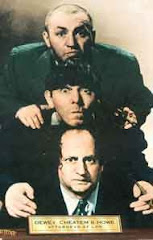
This is a perfect example of the reason I view "Evidence-based medicine" with a suspicious eye. The first reaction is one of interested surprise - "What? 3 out of 10? Amazing! I never would have thought..."
For me at least, there is a second thought process that begins to form when I hear these seemingly unbelievable reports: I begin to assess whether that information is consistent with common sense. Those who preach the religion of Evidence would call that inappropriate, unscientific, or even "allegorical" (that is the new term for idolatry in the Church of Evidence).
Think about it. How many people do you know? How many people are you in contact with? Would you say that 30% of them are "disabled" in some way? I know literally hundreds of people as a result of my work as a doctor. There is no way that 3 out of 10 of them are disabled.
So, then, what does this mean? Am I horribly mistaken? Is there a vast unknown number of Americans with disabilities out there? Have I simply missed them somehow? Or has some sort of error been made in this study?
Errors occur from time to time, and are dealt with by the scientific method itself. Unless of course, the study does not lend itself to scientific methodology. Errors can be of basically two types - (a) errors in data collection and (b) errors in conclusions regarding the data. At the very least, I believe the author of this study is guilty of scientific error. Fortunately for her, her study can not be subjected to scientific scrutiny. Her interpretations of the data indicate that there is something missing - some piece of the puzzle undefined. So much so that a dedicated physician, diligently attempting to find how this study might impact his practice feels left out of the inside joke. So I continue digging...
The author is Barbara M. Altman, Ph.D. A former employee of the CDC's National Center for Health Statistics, Dr. Altman, a psychologist by training, has a long history of research dealing with the disabled. She seems especially interested in the relationship between disability and occupations. In fact, she seems to be a bit of a revolutionary in this field. She supports a new and controversial definition for disability that, as the review of her textbook puts it, "focuses attention on the dual themes of theory and methodology that must form a basis for studies of impairment and disability". It goes on to describe the general aim of the book:
"Issues discussed include: critiques of current concepts of disability; the fit between sociological role theory and the concept of disability; the operationalization of different definitions of disability; conducting surveys with people with impairments; the reliability and utility of several qualitative research methodologies as applied to impairment and disability. Overall, the papers in this volume represent the beginning of a resurgence of interest in social science theories and methodologies within the study of impairment and disability".
Allow me, if you will, to define this for those of you as-yet untrained in the language of Psychotripe. Dr. Altman and her co-editor wish to redefine disability. No longer is it merely the (they would say seriously inadequate) definition which deals with concrete, objective, verifiable facts of inability to perform a certain task. Now this highly-charged social phenomenon of disability is placed into the nebulous universe of the psychologist, where definitions are impossible because nothing has actual meaning. If you read the methodology for the study, you find that Dr. Altman unilaterally uses the broadest possible sense of the term "disability". In her world, disability includes "feelings that interfere with productive work". Under this ridiculous definition, I and the ever-diminishing number of us who actually get up every morning and go to work and make a living are clearly, perhaps permanently, disabled.
Here is the problem. It is fine if Dr. Altman wishes to destroy any useful meaning for the term "disability". In fact, I support her right to live in a self-made universe without meaningful definitions. That will not be enough for Dr. Altman, however. As evidenced by her much-publicized recent study, this will grease the skids for vast increases in tax monies spent to care for this new onslaught of the "disabled". Those of us who are too busy paying for all those leeching off the system already will once again be harnessed with a new yoke.
If we are going to use "Evidence-Based Medicine" as the new standard for practice, I demand that we at least exercise some controls on what constitutes evidence. I barely scratched the surface of this article and found what appears to be a deep, dark, festering core of liberal social engineering, propaganda, and dishonesty. How many other "studies" could be similarly debunked?


























